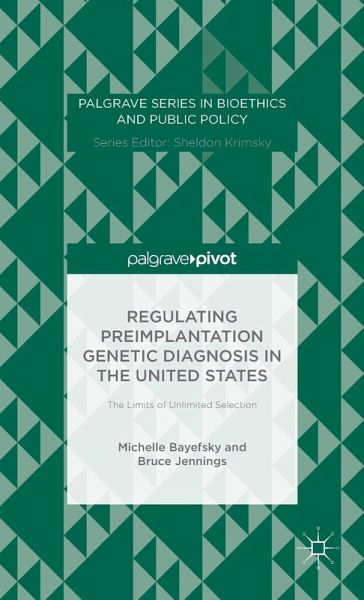
Regulating Preimplantation Genetic Diagnosis in the United States
The Limits of Unlimited Selection
Versandkostenfrei!
Versandfertig in 6-10 Tagen

PAYBACK Punkte
19 °P sammeln!





Reproductive technology allows us to test embryos' genes before deciding whether to transfer them to a woman's uterus. Embryo selection raises many ethical questions but is virtually unregulated in the United States. This comprehensive study considers the ethical, medical, political, and economic aspects of developing appropriate regulation.
Michelle Bayefsky is Pre-doctoral fellow in the Bioethics Department of the National Institutes of Health, USA. She has served as an intern at the Senate HELP Committee and UNESCO's Bioethics Programme, and a researcher at Yale's Interdisciplinary Center for Bioethics, USA. She graduated summa cum laude from Yale University, USA in 2014 with a B.A. in Ethics, Politics and Economics. Bruce Jennings is Director of Bioethics at the Center for Humans and Nature and Senior Advisor at The Hastings Center, USA. He also holds faculty appointments at Vanderbilt University, USA and Yale University, USA. He has written widely on ethics and public policy issues, and is Editor-in-Chief of the influential reference work, Bioethics, 4th Edition (formerly the Encyclopedia of Bioethics), 6 vols. (2014).
Produktdetails
- Palgrave Series in Bioethics and Public Policy
- Verlag: Palgrave Macmillan US / Palgrave Pivot / Springer Palgrave Macmillan
- Artikelnr. des Verlages: 978-1-137-51543-8
- 2015 edition
- Seitenzahl: 113
- Erscheinungstermin: 20. Januar 2015
- Englisch
- Abmessung: 216mm x 140mm x 11mm
- Gewicht: 253g
- ISBN-13: 9781137515438
- ISBN-10: 1137515430
- Artikelnr.: 42200431
Herstellerkennzeichnung
Libri GmbH
Europaallee 1
36244 Bad Hersfeld
gpsr@libri.de
"Bayefsky and Jennings have written an exceptionally smart and thorough analysis of the ethics, politics, and economics of prenatal genetic testing. A must-read for anyone who cares about the future of reproductive technologies and parenthood." - Thomas H. Murray, President Emeritus and Senior Research Scholar of the Hastings Center, USA
'Women undergoing in vitro fertilization can use preimplantation genetic diagnosis to select among their available embryos in order to implant only those that possess, or lack, certain genetic traits. Bayefsky and Jennings have produced an invaluable guide to the ethical, economic and legal questions surrounding this powerful and controversial technique. The book is comprehensive enough, and accessible enough, to be of interest not only to bioethicists and clinicians, but also to students and to women considering in vitro fertilization.' - Stephen R. Latham, JD, PhD, Director, Yale Interdisciplinary Center for Bioethics, USA
'Women undergoing in vitro fertilization can use preimplantation genetic diagnosis to select among their available embryos in order to implant only those that possess, or lack, certain genetic traits. Bayefsky and Jennings have produced an invaluable guide to the ethical, economic and legal questions surrounding this powerful and controversial technique. The book is comprehensive enough, and accessible enough, to be of interest not only to bioethicists and clinicians, but also to students and to women considering in vitro fertilization.' - Stephen R. Latham, JD, PhD, Director, Yale Interdisciplinary Center for Bioethics, USA
Für dieses Produkt wurde noch keine Bewertung abgegeben. Wir würden uns sehr freuen, wenn du die erste Bewertung schreibst!
Eine Bewertung schreiben
Eine Bewertung schreiben
Andere Kunden interessierten sich für











